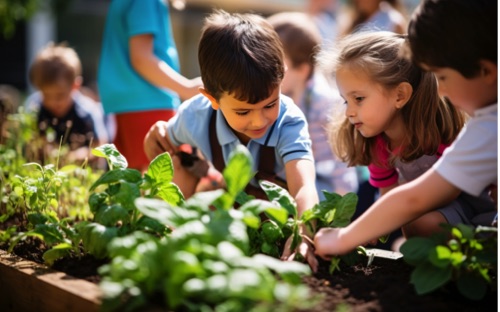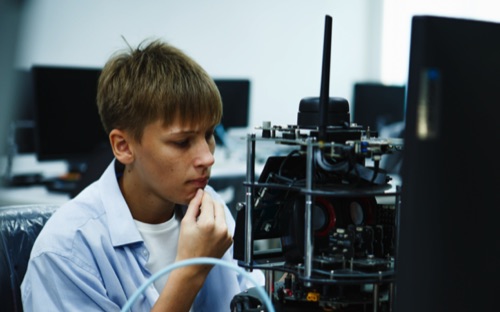"If we apply this learning system in our schools, then Favorite City will go down in history. Because what we can do, all people can do. A new generation of geniuses is growing up, capable of working together to solve the world's big problems!"
Dear Reader,
There is a shortage of teachers in Germany. According to the PISA study, a quarter of students cannot read, write or do math properly. This is also noticeable in Lieblingsstadt. For Michael Miteinand, the town's committed mayor, this is an intolerable state of affairs.
Together with Sibylle Lernfroh, the head of the comprehensive school, he calls his team of experts together for a crisis meeting. Also invited are entrepreneurs, committed parents and representatives of the Lieblingsstadt education association. Michael wants to make Lieblingsstadt a flagship for excellent education.
Kerstin Frank, mother of three children and chairwoman of the education association, speaks up. She explains that the association wants to found a free school. There, the children are to be prepared for life in a way that is brain-friendly and fun. However, the bureaucratic hurdles for founding a school are very high.
"What's going to be done differently there than in our schools?" wants Michael to know.
World's best learning methods combined into one system
Kerstin reports on another educational association whose founder has gathered the world's best learning techniques and is teaching them to students with much success.
Proven memo techniques for names, history and foreign languages, math, pulling roots in your head, mastering number memory and much more - combined into a learning system that allows students and adults to acquire just about any knowledge in the shortest amount of time.
In hundreds of presentations to thousands of students, teachers and parents, it has been shown time and again that any child can learn the normal school material in one hour a day in a playful and fun way.
The association already provides hundreds of learning videos for all kinds of subjects free of charge. The videos have proven their worth during the lockdowns. They are constantly being added to, so that videos are now available for practically all school subjects.
The association constantly receives thank-you letters from students who write in the spirit of: "I used to think I was an idiot. Now I know I'm a genius!"
In German-speaking countries, numerous initiatives are being formed that want to establish free schools according to this system. The main difficulties, however, are the legal requirements. When school projects fail, it is not because of school challenges, but because of legal problems.
"And these methods really work that well?" asks Sibylle.
Tried and tested a thousand times - it works for everyone
"Yes, definitely with all students. The concept has been tried and tested a thousand times. Some students may need half an hour longer, but that shouldn't be a problem," explains Kerstin.
"What if we used this learning system in our schools?" wants Michael to know, "then you wouldn't need to start your own school and all of your favorite city students would become geniuses?"

Kerstin thinks:
"If we apply this learning system in our schools, then Favorite City will go down in history. Because what we can do, all people can do. A new generation of geniuses is growing up, capable of working together to solve the world's big problems!"
All of a sudden it gets quiet - you could have heard a pin drop.
After a while, Siegbert, the city treasurer, breaks the silence:
"If this really works and students only have to study one hour a day, what are they doing the rest of the day? After all, we have a supervisory responsibility."
"Since the students have already completed their compulsory program in one hour, they decide for themselves what additional life lessons they want to learn," Kerstin replies. "That can be very different for each individual.

Some students will learn how to grow food to feed themselves and others healthily in the Solidarity Farming...
...others just have a sniff in the bakery or in the car repair shop...

Depending on their age and interest, they are invited to do internships at our companies to learn about a wide variety of careers."

"Anyone who wants to can learn one or more trades with us," says Robert, a contractor.

"Art, culture and sports can also fascinate," Simon, the cultural director of Favorite City, is pleased to say, "Painting, sculpture, music, theater, cinema, performance... that inspires many young people, not to mention the great sports offer in our city."
"In this way, young people actively shape their 'favorite city', in which they will later enjoy living as adults!" enthuses Michael.
"Do we need additional teachers to do this?" asks Siegbert.
"From the education association, many members will volunteer as learning guides. Peer-to-peer learning has also proved very successful, which means that students teach each other," explains Kerstin, "so we don't need any more teachers - on the contrary, the teachers are relieved. They can devote themselves much better to the individual students."
"In the companies, after all, the young people are supervised," Robert says, "The more you trust the young people, the more self-responsible they become. That's my experience."
The best way to learn is through projects
Siegbert reads in his records, "Teacher shortages are particularly common in the so-called STEM subjects, which are math, computer science, science and technology."
"The best way to learn these topics is through projects." Roman, the owner of LieblingsTEC, a local technology company, knows what he's talking about. He is the founder of KidsTEC e.V., an association in which technically talented children and young people come together in agile teams to develop unconventional solutions to a wide variety of problems. They have already won several prizes in 'Jugend Forscht' and similar competitions.
"Young people never cease to amaze us," adds Roman, "it's usually us who learn from them and not the other way around. We adults really only need to create the framework conditions, and the kids come up with solutions that we would never have thought of in life."

Roman suggests sitting down with STEM teachers, KidsTEC and students to design exciting projects together. When realizing the projects, the teaching material flows in virtually as a sideline.
"Math and science are easy when you can use them to fulfill your desires. Then the synapses in your brain fire, and you learn at record speed. We experience that every day at KidsTEC. The best ideas come from the kids!"

Now life comes into the room. Everyone seems to be talking to everyone else, and the ideas are just bubbling up...
"My dear friends," Michael takes the floor, "This is fantastic - this will be another milestone in our great collaboration!"
After a brief pause for thought, he continues:
"And again, we have a lot of volunteer work going on, the education association, KidsTEC and of course the students, who get involved in the various projects and thus create a huge added value - for themselves, for the community and for the big picture. According to the Gradido model, all volunteer work is remunerated at 20 Gradido per hour - currently still up to a maximum of 1000 Gradido per head per month, but we are developing further here as well."
The 'Great cooperation' takes on unexpected dimensions. In the 14th episode of the popular series "Gradido in favorite city" the inhabitants of Favorite City literally save the world - or rather, they ensure that a generation of geniuses grows up who will be able to solve the world's big problems.
It has been definitively proven that cooperation is many times better than competition. Because what our favorite city dwellers can do, all the people in the world can do. And that's a good thing, because we can only solve humanity's problems together.
This educational project also runs largely on a voluntary basis. With the help of the honorary work remuneration system 'Gradido', the voluntary work is remunerated with 20 Gradido per hour.
For the Gradidos, there are a variety of benefits and discounts that can be redeemed at local businesses. In addition, there is a lively exchange among the citizens. This reduces costs for all involved, and great projects become feasible. A win-win-win situation for everyone!
Feel free to forward this series to your city council, clubs and businesses!
With Gradido and the Great Cooperation we generate Upward spirals to positively shape the future in a sustainable way. Together, we are transforming our cities and towns into vibrant thriving oases - our favorite places!
Love greetings
Yours

Margret Baier and Bernd Hückstädt
Gradido founder and developer
PS: Due to the ever-growing importance of Gradido, we are repeating our gratitude campaign on October 25, 2025: In addition to the multiple GradidoTransform for your sponsorship contribution, we will increase all GDT account balances by 25% on 25.10.25. Sponsor now and enjoy the multiple amount of GDT!
